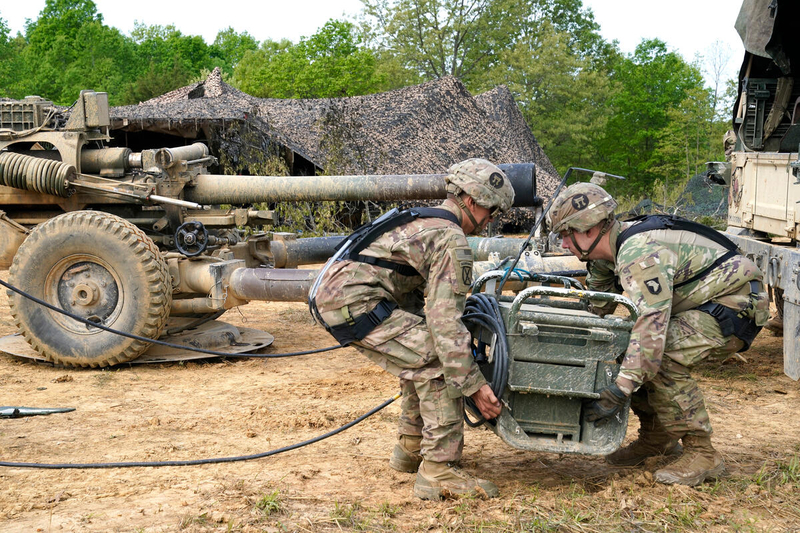

-
$23.2M
DOD Funding at Vanderbilt
FY 2023
Soldiers partner with Vanderbilt researchers to create a new model for innovation
Soldiers from the 101st Airborne Division, the 160th Special Operations Aviation Regiment and the 5th Group at Fort Campbell are collaborating with Vanderbilt University researchers to solve tactical problems and create new Army capabilities that benefit national security. This partnership has become a model for military-academic collaboration and has expanded to include a collaborative agreement with the U.S. Army Special Operations Command.
Examples of the innovative outcomes from this partnership include:
- Vanderbilt engineers collaborated with Soldiers at Fort Campbell to create an AI-enabled smart radio for the U.S. Army. The Adaptive Dynamic Spectrum Radio is now used by the 101st Airborne Division deployed in Romania as part of the Department of Defense-funded Pathfinder Project for modernization goals.
- A professor of ophthalmology and visual sciences is working with the U.S. Army and 160th Special Operations Aviation Regiment to address the impact of percussive forces on soldiers’ performance and health during flight. This project aims to optimize neurological performance through training protocols and improve aircraft design to reduce in-flight vibration and percussion experienced by pilots and crew, potentially benefiting soldiers.
- Vanderbilt engineers designed an exoskeleton, the Soldier Assistive Bionic Exosuit for Resupply, in collaboration with the 101st Airborne Division, to alleviate back strain and injuries caused by heavy lifting during logistics operations. The exoskeleton is being prepared for manufacturing and commercialization by HeroWear, a spin-off company, while the Army plans to deploy it in the field.
Transdisciplinary researchers, soldiers and industry partners are collaborating on projects to pioneer technologies for both soldiers and civilians, such as predictive maintenance for Army helicopters and foreign language training aids for soldiers. Vanderbilt has invested in equipment for rapid prototyping and mobile measurements to advance soldier-centered innovation at Fort Campbell. The partnership with the University of Tennessee is accelerating learning for students in STEM management, entrepreneurship and design, while providing additional laboratory space and expertise to address modern challenges facing soldiers.
Vanderbilt leads in radiation effects research on electronics
The Institute for Space and Defense Electronics at Vanderbilt University leads the Center of Excellence in Radiation Effects sponsored by the Air Force Office of Scientific Research Lab. The $5 million, five-year program is developing tools, experimental techniques, theoretical understanding, and models that can be applied to multiple emerging technologies that will be integral to advanced satellite systems, GPS navigation, remote sensing, communications and other electronics applications. The capabilities developed through the center will contribute to a wide range of Department of Defense programs and systems. The DOD currently funds work on many electronic and photonic systems that have the potential to provide dramatic improvements in space microelectronics, but little is known about how these new systems will perform or survive in extreme environments, particularly those with significant radiation requirements.
ISDE also leads the Radiation Hardened Microelectronics Technical Vertical of DOD’s workforce development program called SCalable Asymmetric Lifecycle Engagement. SCALE concentrates on workforce development at the undergraduate and graduate levels to address demand for a workforce trained in radiation testing. Now in its fourth year, the team includes nine universities and over 125 students. Through SCALE, ISDE has received $1.64 million to create a new program to develop and deploy a simulator/emulator based on the same concepts used in flight simulators to train pilots and astronauts; called Lab RaTTS, the program will help train engineers in radiation testing.
ISDE receives around $5 million in annual funding from various organizations, including the Navy, Air Force and NASA. They focus on radiation effects for strategic applications and microelectronics research for space applications. ISDE has trained over 150 engineers with master’s degrees and Ph.D.s, who have gone on to work in government, industry, and academia, supporting the nation's efforts in radiation hardening and microelectronics research.
Institute for Software Integrated Systems
Founded in 1998, Vanderbilt’s Institute for Software Integrated Systems is a key national player in an effort to design the software-integrated systems that have become an essential part of human lives today—in consumer appliances, vehicles, planes, hospitals, schools, design shops, factories, space systems and the energy sector. Major sponsors of the institute include the Defense Advanced Research Projects Agency, the Air Force, the Army, the Navy, the National Science Foundation, the National Security Agency, the Department of Energy, the Department of Education and NASA. The institute has received more than $243 million in federal funding since 1998—approximately 60 percent of which is from DOD.
From its inception, the institute was intentionally designed to address defense needs and enable protection against cyberattacks in real-world systems (e.g., power grids, transportation, robotics) and translation of high-impact solutions into the hands of national security and armed forces end-users. Since 2012, they have served as a Science of Security virtual organization for the National Security Agency and have one of six national Science of Security Lablets.
DOD supports Vanderbilt students
Several students from Vanderbilt University have received prestigious DOD awards and fellowships.
- A student in the College of Arts and Science received the DOD SMART scholarship, which provides mentorship, summer internships, a stipend, and full-time employment with the DOD after graduation.
- A second-year biological sciences Ph.D. student received the highly competitive National Defense Science and Engineering Graduate Fellowship, sponsored and funded by the DOD.
- Peabody College of education and human development doctoral students were awarded the 2022 David L. Boren Fellowships, which support graduate students studying critical languages, cultures, and world regions.
- Additionally, three students were named 2023 Barry Goldwater Scholars, a program for undergraduate STEM students who show exceptional promise for research leadership.
DOD SBIR/STTR funding at Vanderbilt
Four companies with ties to Vanderbilt are recipients of highly competitive Small Business Innovation Research/Small Business Technology Transfer grants from DOD.
- ARMS Cyber Defense Inc. – develops adaptive cyber technologies for creating a strategic defender advantage.
- HeroWear LLC – designs back-assist exosuits to reduce strain on the back while fitting like a comfortable piece of clothing.
- SkyNano LLC – a science-based technology company that focuses on commercializing a free-market solution to carbon pollution.
- International FemtoScience Inc. – develops and utilizes functionalized diamond nanoparticle technologies to produce products as additives for enhanced thermal and mechanical performance of liquids and solids.
The SBIR/STTR program encourages small businesses to participate in federal research and development with the potential for commercialization. This program plays a vital role in the innovation ecosystem at Vanderbilt by supporting startups in the early stages of research and development.
The Wond’ry, Vanderbilt’s Innovation Center, and the Center for Technology Transfer and Commercialization at Vanderbilt University contributed to the startups’ growth in various capacities, from assisting with ideation and R&D to facilitating invention disclosures and commercialization services. Founders of these startups span Vanderbilt faculty, alumni, staff and students.
According to Launch Tennessee, companies awarded their SBIR/STTR matching funds have created more than 939 direct jobs and had an economic impact of $146,125,214 in Tennessee—a return of $11.24 for every public dollar invested into the program.
Vanderbilt-initiated startup Zeno Power receives $30M to build the first commercially developed nuclear–powered satellite
Zeno Power, a startup initiated through the Wond’ry, Vanderbilt’s Innovation Center, has received a total of $30 million from the U.S. Department of Defense and private investors to develop and build a flight-ready radioisotope-powered satellite by 2025. It is expected to be the first launch of a commercially developed space nuclear system in history. Zeno Power’s mission is to provide clean, plug-and-play power, anywhere in the universe.
For more information, please contact the Vanderbilt Office of Federal Relations:
Christina West 202-216-4370 | Heather Bloemhard 202-216-4368
federalrelations@vanderbilt.edu
FY 2023